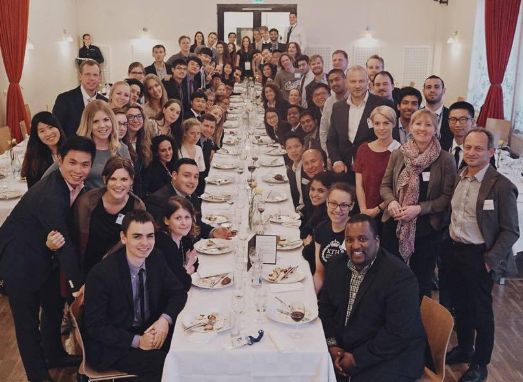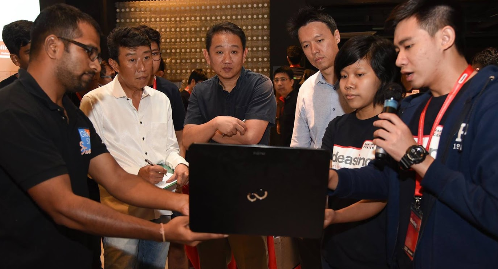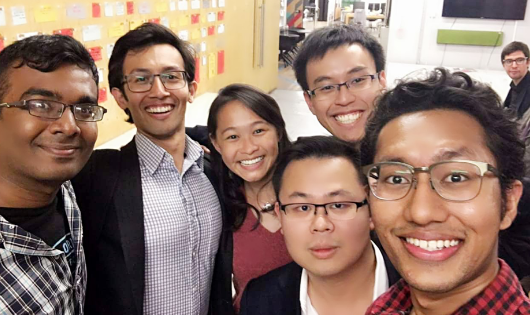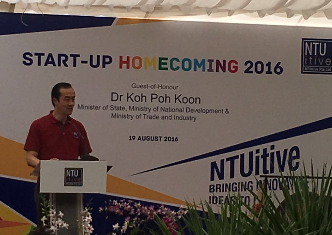Do entrepreneurs need a university education? After all, Bill Gates, Steve Jobs and Mark Zuckerberg all dropped out of university. However, they spent much of their formative years in university, and, for some, made connections during this time that would be vital to their success. There is an even longer list of successful entrepreneurs, like Jack Ma, Elon Musk and Larry Page, who graduated from university with excellent grades, too.
I believe that university is useful for building skills and networks that will be helpful for building your future business. The good news is, there are plenty of opportunities in NTU that set you towards your goal.
Here are eight steps aspiring entrepreneurs in NTU can take to kickstart their dreams.
1. Join the NTU Entrepreneurship Society
A community dedicated to providing opportunities for every entrepreneurial-minded undergraduate, this is the first place in NTU for you to learn about entrepreneurship. Here, students can meet and learn from experienced entrepreneurs through workshops and other events. I can vouch for the usefulness of these sessions as the former President of the Society.
 Train your entrepreneurial skills or even find the co-founder of your company here.
Train your entrepreneurial skills or even find the co-founder of your company here.
2. Register for a Minor in Entrepreneurship
Organised by Nanyang Technopreneurship Centre (NTC), the Minor in Entrepreneurship programme is a series of five modules that cover topics from start-up marketing to actually running your own venture. Classes are taught by experienced entrepreneurs and conducted during the holidays. And yes, you can clear your academic requirements with it!
 Before classes start, students in the programme participate in a three-day Outward Bound Singapore team-building course.
Before classes start, students in the programme participate in a three-day Outward Bound Singapore team-building course.
3. Take part in the Innovation Immersion Programme
A collaboration between NTU and top universities worldwide, this programme lets students work as consultants for international start-ups. Each team is made up of students from different countries and communication is done entirely online, which reflects the evolving work culture of the world today. Upon completing the programme, you’ll be flown to your clients’ country to deliver the final project presentation. My experience – consulting for Collabodoc, a Swedish medical start-up – helped me to grow immensely as a businessman.
 Participants from all over the world finally meet in person.
Participants from all over the world finally meet in person.
4. Compete in the IdeasInc Competition
IdeasInc is one of the most popular start-up competitions in Singapore. Each year, IdeasInc selects 40 teams to participate in a series of training workshops followed by a pitching competition. This exposes the teams to real investors and the start-up ecosystem in Singapore. There is a good chance that your business idea will get funding if you make it to the last round. And even if you don’t, you still get to learn a lot!
 IdeasInc participants introducing their prototype.
IdeasInc participants introducing their prototype.
5. Pack your bags for the Overseas Entrepreneurship Programme
Nurture leadership, cultural competence and entrepreneurial skills while getting a chance to travel through this programme. You will get to immerse yourself in one of the start-up hotspots across the globe – from San Francisco to Beijing, Shanghai and London – by doing an internship there alongside passionate start-up founders. My friends on this programme have been able to build valuable connections and gain work experience that will definitely help to kick-start their businesses.
 Budding entrepreneurs having a blast in London.
Budding entrepreneurs having a blast in London.
6. Build your start-up in the NTUitive Incubator Programme
Seek mentorship, working space and patent protection for your business ideas right on campus. Many successful start-ups have been founded through this route. This includes EverComm, whose founder Ted Chen is listed on Forbes’ 30 Under 30 Asia list for manufacturing and energy. Recently, Startup Homecoming 2016 brought NTUitive-incubated start-ups and industry venture capitalists together.
 Dr Koh Poh Koon, Minister of State, Ministry of National Development & Ministry of Trade and Industry, inspiring us as guest speaker.
Dr Koh Poh Koon, Minister of State, Ministry of National Development & Ministry of Trade and Industry, inspiring us as guest speaker.
7. Go for entrepreneurship meetups and events
Make use of these events to conduct market surveys and get business validation for your business ideas. The Nanyang Technopreneurship Centre organises the annual Entrepreneurship and Innovation Week with start-up bazaars, workshops, events and movie screenings on campus. The monthly Makan Night by NTUitive is another networking event where you can expect to meet and interact with experienced entrepreneurs. Most of these events are usually free and fun, so do keep a look out!
 Iron Man, Marvel’s technopreneur superhero, on screen as part of a movie marathon organised by the Nanyang Technopreneurship Centre.
Iron Man, Marvel’s technopreneur superhero, on screen as part of a movie marathon organised by the Nanyang Technopreneurship Centre.
8. Take part in overseas programmes
NTU alumnus Chinmay Malaviya, co-founder of foodpanda, has credited his overseas exchange for planting the seeds of entrepreneurship in him. If you are planning to go for an overseas exchange programme but also want to learn more about entrepreneurship, you can find such opportunities from the Office of Global Education and Mobility (OGEM). I did a summer exchange programme at University of California, Berkeley, which is really near Silicon Valley, where the forefront of technopreneurship is. During my exchange, I visited tech giants like Facebook and Google and joined many entrepreneurship meetup events.
 I visited the Facebook headquarters in Silicon Valley while on exchange at UC Berkeley.
I visited the Facebook headquarters in Silicon Valley while on exchange at UC Berkeley.
The best time to learn is when you are still young and in university, with not as much to lose even if you fail. So when a great opportunity appears, don’t hesitate and go for it.
Huang Kai is a third-year double degree computer science and business student, and a former President of the NTU Entrepreneurship Society. He is working on a start-up, hasBrain, which prepares software developers for the industry. He believes entrepreneurship is an exciting and viable career path, and encourages fellow students burning with the spirit of entrepreneurship to ignite those flames.

